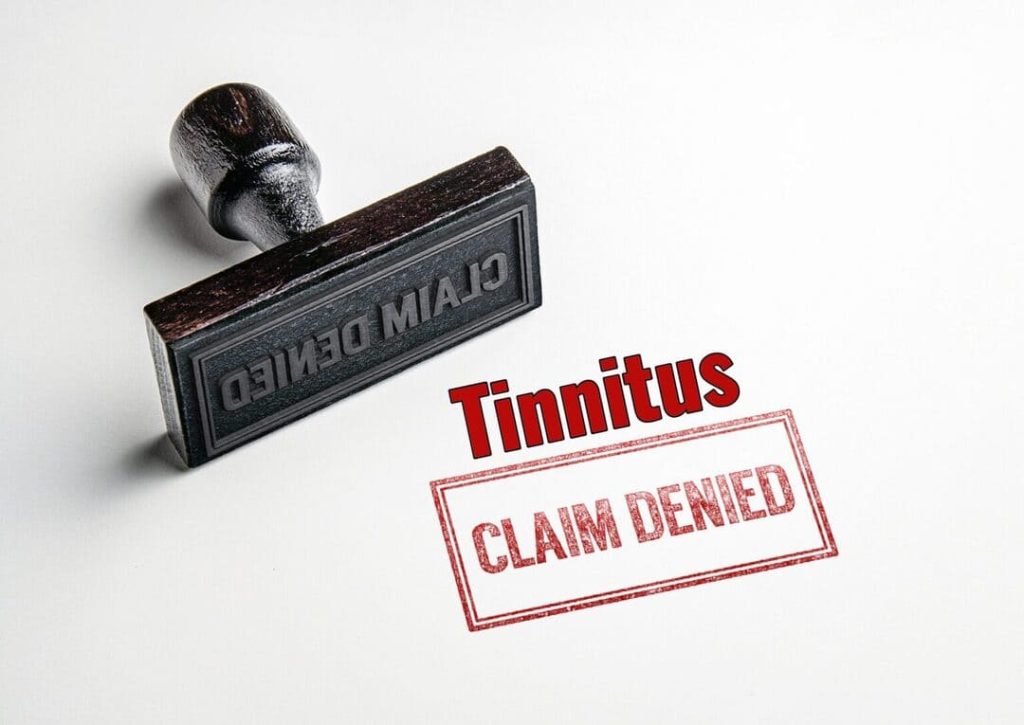Looking for Expert-Level VA Claim Answers?📱Call Us Now! 737-295-2226
How is a VA claim for tinnitus denied? Can it still lead to a successful claim outcome?
Tinnitus is one of the most common service-connected disabilities among veterans, yet many find their VA claims denied despite experiencing persistent ringing, buzzing, or hissing in their ears due to noise exposure and other factors while on active duty.
A denied VA tinnitus claim can be frustrating, but understanding the reasons behind it can give you the knowledge to take the right steps to secure the VA compensation and benefits you rightfully deserve.
Table of Contents
Summary of Key Points
- Many veterans experience tinnitus due to military noise exposure, combat and training environments, and head and neck injuries.
- Your VA tinnitus claim may be denied if you fail to provide service treatment records, medical history, or lay statements supporting your symptoms.
- If the VA denies your tinnitus claim, carefully review your decision letter to identify the specific reasons for the denial and determine the best action for an appeal.
How the VA Rates Tinnitus
The VA rates tinnitus at 10% under diagnostic code (DC) 6260, regardless of whether one or both ears are affected. Despite being a common service-connected disability, there is still the possibility of denial.
The VA requires sufficient medical evidence and proof of an in-service event to establish a service connection.

How is a VA Claim for Tinnitus Denied?
If your VA tinnitus claim was denied and you’re unsure why, here are 6 of the most common reasons for a tinnitus claim denial.
Missing Tinnitus Diagnosis
The VA may deny your tinnitus VA claim if you don’t have a current diagnosis. The VA can’t process your claim without a current medical diagnosis of tinnitus.
You can prove this with service treatment records, VA medical records, or private medical records from your healthcare providers.
If you haven’t seen your doctor to receive a current medical diagnosis of tinnitus, you must make an appointment immediately.
Note: No evidence of hearing loss should NOT be a factor for denying a tinnitus claim because hearing loss and tinnitus are separate claims.
Lack of Medical Evidence
One of the most frequent reasons for a tinnitus claim denial is a lack of supporting evidence. However, a medical opinion is not always required if there is credible lay evidence demonstrating continuity of symptoms.
VA medical records and evaluations from healthcare providers are crucial in proving that your tinnitus is a service-connected disability, and credible lay evidence can also support your claim.
No Service-Connection
The VA may deny a tinnitus claim if there is insufficient evidence linking the condition to military service.
To prove service-connection, you must provide evidence of:
- A current medical diagnosis
- An in-service injury, illness
- A medical nexus (a link connecting your tinnitus to your military service).
Unclear Symptom Onset
Your claim may be denied if you fail to provide a clear and consistent account of when your tinnitus symptoms began during military service. While an exact date is not required, describing the approximate time frame of onset can help support your claim.
Ideally, you should be able to clearly describe your tinnitus symptoms and explain how they impact work, daily life, and social interactions.
Missed C&P Exam
While not everyone is required to attend a compensation & exam (C&P), you must attend if one is scheduled for you.
A C&P exam helps the VA better understand and rate your condition. However, if you miss the exam, they will decide your claim based on the evidence they have.
See More: What Happens If I Skip My VA C&P Exam?
Pre-Existing or Non-Service-Connected Causes
The VA may review that your tinnitus is due to age, medications, or other health conditions rather than military service.
For example, if your tinnitus symptoms appeared years after leaving the military, the VA might request a medical opinion to determine if it is service connected.
In addition, the VA may question a tinnitus claim if it believes mental health issues, high blood pressure, or inner ear problems unrelated to military service cause your condition.
Medical examinations by medical professionals can help clarify the primary cause of your tinnitus and strengthen your VA disability claim.

Denied Tinnitus VA Claim? Take These Next Steps
Step #1: Review Your Rating Decision Letter
If your VA claim for tinnitus was denied, the first thing you should do is review your VA rating decision letter, specifically, the section headers marked “evidence” and “reasons for decision.”
- In the “Evidence” section, make sure ALL your submitted evidence is listed and was considered by the VA rater.
- Next, in the “Reasons for Decision” section, make sure to read in-detail the rationale and reason(s) for the denial.
Common errors include not considering some or all the evidence, discounting the probative value of the medical evidence, or making an illogical “less likely than not” argument against service connection by failing to consider all relevant facts.
Step #2 Gather Additional Evidence
Strengthen your case with new or stronger evidence, including:
- VA medical records and hospital records
- Private medical records and hospital reports
- Supporting statements
- A nexus letter linking your tinnitus to your military service
Step #3: File an Appeal
You can file an appeal if you disagree with the VA’s decision on your tinnitus VA claim.
Your appeal options are:
- File a Higher-Level Review to ask for a higher-level reviewer to review your case. (You can’t submit new evidence.)
- File a Supplemental Claim if you have new and relevant evidence that the VA didn’t have when they reviewed your case before.
- Appeal to the Board of Veterans’ Appeals to have a Veterans Law Judge review your case.
How to Prove Your Tinnitus is Service-Connected
Proving that your tinnitus is service-connected can be challenging, but with the right steps, you can strengthen your VA claim. Here’s how:
- Gather Medical Records: Ensure you have documented evidence of your tinnitus current diagnosis, including audiologist evaluations and any treatment records. This establishes that you have the condition.
- Provide Service Treatment Records (STRs): Service treatment records can show any incidents, injuries, or conditions that might have contributed to your tinnitus. If your military service involved exposure to loud noises, such as gunfire or aircraft engines, highlight these instances.
- Submit a Nexus Letter: A nexus letter from a medical professional can make a significant difference. This letter should explain how your tinnitus is likely linked to your military service, based on the noise exposure or trauma you experienced during service.
- File a Personal Statement: Write a personal statement that outlines the timeline of your tinnitus symptoms and the impact it has had on your life. Include any in-service events or experiences that may have contributed to the onset of your condition.
- Document the Onset of Symptoms: Be clear about when your tinnitus first appeared and how it has progressed over time. If possible, tie the onset to a specific event or period during your service.
- Provide Statements from Fellow Service Members: If others witnessed your exposure to loud noises or can confirm your symptoms, ask them to provide statements that support your claim.
- Demonstrate the Impact on Daily Life: The VA will assess how tinnitus affects your daily functioning. The more you can demonstrate the negative impact it has on your ability to work, socialize, or perform daily tasks, the stronger your case.
Pro Tip: By gathering thorough documentation and establishing a clear link between your tinnitus and your service, you can increase the likelihood of a successful VA claim.
(FAQs) Frequently Asked Questions
Why did the VA deny my tinnitus claim?
A VA tinnitus claim may be denied if the veteran does not specify when their symptoms began or fails to establish a service-related cause.
How do I prove tinnitus to the VA?
You need to show that your tinnitus was caused or worsened by your military service, often through service treatment records, an in-service injury report, or a nexus letter from a medical professional.
What is the highest VA rating for tinnitus?
The highest VA rating for tinnitus is 10%, regardless of whether the condition affects one or both ears.
Can I receive VA disability benefits for ringing in ears?
Yes, ringing-in-ears VA disability claims, also known as tinnitus claims, are eligible for compensation if you can prove a service connection.
Want Expert-Level Support for Your Denied Tinnitus VA Disability Claim? WE GOT YOUR SIX!

- VA Claims Insider is the #1 most trusted name in VA disability claims.
- Work directly with a VA claims coach who can educate you to VA claim victory.
- 25,000+ disabled veterans have served in our membership programs since 2016.
- 30% average rating increase for veterans who complete our #1 rated Elite program.
- 4.7/5.0 average rating out of 5,500+ total reviews; over 4,500 5-star reviews.
About the Author

Kelly Olone
Kelly Olone is a military spouse who earned her degree in Psychology from Florida International University. After working in the non-profit sector for several years, she turned to her passion for writing. She aims to contribute to a better understanding of the valuable benefits that veterans deserve. As a mom, Kelly navigates the delicate balance between deadlines and bedtime stories with finesse.




